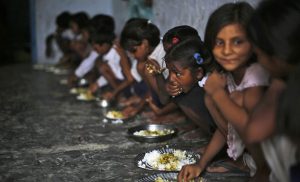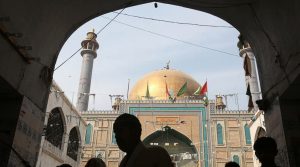
10-03-2017 (Important News Clippings)
To Download Click Here
Big Brother Wants More

This model was supposed to wipe out graft in the subsidy system. Replace subsidies with cash, let the system be voluntary — only poor, consenting adults need to join.
On the face of it, it was a benign order. Today, it stinks of all that was wrong when Eric Arthur Blair wrote about this sort of thingYou’re the MealOn February 28, the government — through Prakash Javadekar, minister of human resource development — said every child with access to school education and a midday meal scheme should line up for Aadhaar.So, children from Porbandar to Purulia and Gangtok to Guntur will have to get their fingerprints and eyes registered electronically to get one meal from a government-sponsored school? Yes, if the ministry’s fatwa is correct. Kids in Jammu & Kashmir, Meghalaya and Assam are exempt, mysteriously, from this fatwa. Which means they can have lunch without logging into the all-seeing sarkari eye in the sky.
There are many things wrong with this. First, Aadhaar was designed to be a voluntary scheme, which means only consenting adults could take part. And why not?Innocent kids know nothing about costs, prices and subsidies, which is what Aadhaar was supposed to be about. What does a10-year-old know about cooking gas subsidies?
Given that, what is the logic to link Aadhaar with primary school education? Or a free lunch in school? Does the state have the right to deny a meal to a poor child if she hasn’t signed up to be fingerprinted?Second, it is silly to assume, as the sarkar must have done, that it is better to dole out cash rather than fresh cooked meals at schools. Yes, the anganwadi or crèche system or the midday meal scheme can go wrong sometimes because of the lack of basic hygiene or awareness in the hinterland. But those events are outliers.
On average, the anganwadi system for young children and midday meal schemes in schools are doing all right, thank you very much.The midday meal scheme as well as the Right to Education Act, which GoI signed in 2009, ensured that kids landed up in schools, whatever the standard of teaching was. Across states, the level of government school teaching ranges from ‘nothing’ to ‘good’. Even assuming nothing is taught but a meal is served, the kids and their parents are better off.
Suppose every child lines up to get fingerprinted and her retina recorded and the sarkar decides to reward her parents with cash equal to the value of the midday meal. Given the graft and porosity of states’ administrations, what is the guarantee that even a single rupee will come through? Is this a replacement for a garam meal at lunch in school?Even if teachers don’t teach much in sarkari schools, anganwadi workers land up everyday, whatever the weather, to feed the kids their midday meal. This was a tradition that began in Madras (now Chennai) in the mid-1920s, when the first midday meal scheme was started in schools. That it continues today is a mark of its robustness.
No Such Thing as a Free LunchThree, replacing a midday meal with cash transfers will be a blow to skills of socialisation — and possibly national homogeneity. But does the government care?In our society, where norms about how you eat and with whom are rampant and it’s a shame to share a cup of water with someone across a caste or class or religious divide, a shared school meal makes a big difference.
Why? Sharing a meal in school, without having to bother about the identity of the person sharing it with you, can teach a lesson for life to young children. Not knowing or caring about the caste or religion of the person cooking the meal might help dilute narrow identities in young minds.Applied properly and voluntarily to the correct projects and people, Aadhaar is an excellent idea. Imposed on poor, schoolgoing children, to possibly deprive them of fresh lunch, socialisation and attendance will be an abomination.
In that case, ask yourself why the sarkar wills this. The only logical answer I can think of is to build a database of every child who will become an adult in 10 years or so. This is a frightening thought.Eric Arthur Blair, born in Motihari, modern Bihar, officer in Burma, journalist in Britain, volunteer in the Spanish Civil War, would probably have had a telling phrase to describe this recent drive by the government. After all, under his pen name, George Orwell, he wrote today’s bestseller, Nineteen Eighty-Four. And he coined the phrase, ‘Big Brother is watching you’.
Date:10-03-17
Government’s decision to focus on learning outcomes is commendable

Learning outcomes are statements of what a student should know and understand after completion of a process of learning. The pace at which a child learns is a function of the development of his/her cognitive ability. This is determined by socioeconomic background and the educational attainment of the parents, apart from what happens in the classroom.
The bulk of the primary school students are first-generation learners with little by way of family educational resources. They are handicapped with a learning disadvantage right from the beginning. However, the Sarva Shiksha Abhiyan shows that notwithstanding the parents’ low educational attainments, they are immensely supportive of their children attending school. It is parental support that helped achieve near-total enrolment. Efforts to improve learning have to build on this support. Inability to meet set goals should not end up discouraging students from returning to school.
Giving variations in cognitive development, it would be more productive to set longer-term learning outcome targets, for instance, by end of primary school or Class IV, giving students the flexibility to learn at their own pace without the stigma of being slow or failing. It will allow teachers to devise learning and assessment programmes tailored to the students’ need, focusing on augmenting ability without sacrificing learning. A system that is flexible and responsive to the student profile will, naturally, call for high levels of accountability, as well.
विशाखा केस के 20 साल बाद महिलाएं कितनी आजाद
उच्चतम न्यायालय ने 1997 में सुनाए अपने फैसले में कार्यस्थल पर यौन उत्पीडऩ की परिभाषा तय करने और इससे निपटने के दिशानिर्देश तय करने के साथ ही स्त्री-पुरुष समानता के लिए नया आधार तैयार किया था। सवाल यह है कि इस फैसले के 20 साल बीतने के बाद इसकी विरासत का आकलन किस तरह किया जाएगा? हमें यह स्वीकार करना चाहिए कि जनहित याचिका दायर करने वाले गैरसरकारी संगठन के नाम पर चर्चित विशाखा केस में आए फैसले ने विभिन्न कारणों से महिला अधिकारों को सशक्त तरीके से आगे बढ़ाने का काम किया है। यह मामला राजस्थान में जमीनी स्तर पर काम करने वाली एक महिला कार्यकर्ता के साथ हुए सामूहिक बलात्कार से जुड़ा था। उसने बाल विवाह रोकने की कोशिश की थी जिससे गुस्साए अगड़ी जातियों के लोगों ने उसके साथ दुष्कर्म कर दिया था। यह मामला उच्चतम न्यायालय तक पहुंचा था।तत्कालीन मुख्य न्यायाधीश जे एस वर्मा की अध्यक्षता वाले पीठ ने कार्यस्थल पर यौन उत्पीडऩ से संबंधित निर्देश जारी करने के साथ ही कहा था कि समाज के भीतर कितनी गहराई तक स्त्री जाति के प्रति विद्वेष है, भारत का औसत कार्यस्थल बुरी तरह से स्त्री-विरोधी है। विशाखा केस में कार्यस्थल पर होने वाले उत्पीडऩ को इस तरह से परिभाषित किया गया था कि उसमें भारतीय दंड संहिता की तीन धाराओं का जिक्र था। खास बात यह है कि सहकर्मियों के लंपट व्यवहार को भी उत्पीडऩ के इस दायरे में शामिल किया गया था। अब उत्पीडऩ का मतलब केवल शारीरिक संपर्क तक ही सीमित नहीं रहा था।
The Wrong Antidote
To be a real cure for extremism, Sufism has to return to its essence of selfless service.

The politics of Shah, who enjoyed influence among Muslims in Rajasthan’s impoverished areas bordering Sindh, mirrored cosiness many Sufi heirs have enjoyed with whosoever is in power. Several pir families have for decades used their spiritual lineage to further their politics cutting across party lines in Pakistan. Most of them are also feudal lords, whose ostentatious lifestyles and corrupt practices are alien to the idea of Sufism. The idea has long mutated with the association of those helming it — purely by virtue of heredity — with corrosive power, patronage and vanity. This makes it a bit far-fetched to suggest that Sufism, in its present form, can be an antidote to extremism.
The recent attack on Lal Shahbaz Qalandar’s shrine in Pakistan has revived this simplistic assumption. The glory of the Sufi past is something to be proud of. But it would not help much in dealing with nihilistic ideologies that drive terrorist groups like IS. Sufis were practitioners of love, who won over people with their selfless service to humanity, aversion to materialism and distance from the corrupting influence of power. They were exceptional scholars of Islam too. Kashmir’s patron saint, Mir Syed Ali Hamadani, for instance, wrote Dhakhirat al-Muluk in the 14th century, guiding rulers on how to be just to their subjects irrespective of religious differences. How many present-day “Sufis” have written books to counter extremist ideologies? Far from it, they have antagonised many right-thinking people with their tendency to keep on the right side of the powers that be no matter how inimical they may be to the larger community. Let us face it, Sufi shrines have become easy sources of money for those claiming descent from the saints to support their lavish lifestyles. When you have it easy, why bother with the rigours of scholarship?
Moinuddin Chishti must have turned in his grave regarding the slugfest over who would get Pakistani leader Asif Ali Zardari’s Rs 5 crore offering at his shrine in Ajmer in 2012. The claimants argued for months over whether it should go to the khadim (attendant) who helped the Pakistani leader with rituals or be shared with an elected body of hereditary khadims and a government-appointed administrative panel.
In any case, you do not have to be a Shia, Sunni, Sufi etc. to recognise the evil that terrorism is. The tendency to divide Muslims into the so-called good and bad categories is counterproductive in the fight against the menace. The fight is as much theirs as anyone else. In Iraq, top Shia cleric’s call that united the country to give a bloody nose to the IS may have a lesson or two for the rest of the world to emulate.
इस्लामिक स्टेट की दस्तक
पहली नजर में इसमें कोई बहुत बड़ी बात नहीं दिखती। तेलंगाना से मिले कुछ सुराग, उज्जैन में एक ट्रेन में मामूली सा विस्फोट, लखनऊ में लंबी चली मुठभेड़ के बाद एक आतंकवादी को मार गिराना व कुछ गिरफ्तारियां। भारत जैसे देश के लिए, जो पिछले कई साल से लगातार आतंकवादियों से लोहा ले रहा है, यह कोई बहुत बड़ी खबर नहीं है। लेकिन मंगलवार को आतंकवाद का जो मॉड्यूल पकड़ में आया, उसका मामला इतना सरल नहीं है, इसने सुरक्षा बलों से लेकर आतंकवाद विशेषज्ञों तक सभी को परेशानी में डाल दिया है। ये वारदात अपने आप में भले ही बहुत बड़ी न हों, लेकिन पहली बार ऐसा हुआ है कि भारत में किसी आतंकवादी वारदात में इराक और सीरिया में सक्रिय इस्लामिक स्टेट की छाप दिखाई दी है। अभी तक हम जिस आतंकवाद से टकराते रहे हैं, वह आमतौर पर पाकिस्तान प्रायोजित आतंकवाद रहा है, लेकिन पहली बार ग्लोबल आतंकवाद ने भारत में दस्तक दी है। ऐसा नहीं है कि इस्लामिक स्टेट से जुड़े लोगों की सक्रियता इससे पहले भारत में नहीं थी। वह सक्रियता सिर्फ लोगों को भर्ती करने तक ही सीमित थी। इस्लामिक स्टेट से जुड़े कई भारतीयों के नाम भी पिछले कुछ समय में हमें सुनाई देते रहे हैं, लेकिन इनमें ऐसा कोई नहीं था, जिसने भारत को आतंकी हमले का शिकार बनाया हो। यह भी कहा जाता था कि इस्लामिक स्टेट में भारत की उपस्थिति लगभग नगण्य है। जिस तरह पाकिस्तान, यूरोपीय देशों और अमेरिका तक से लोग शामिल हुए, उसके मुकाबले उसमें शामिल होने वाले भारतीय बहुत कम थे। यह पहली बार है, जब भारत में हुई किसी आतंकवादी वारदात से सीधे इस्लामिक स्टेट का नाम जुड़ा है।
इसे एक अकेली घटना मानकर भी नजरअंदाज नहीं किया जा सकता। यह खबर तो काफी पहले से थी कि इस्लामिक स्टेट ने इराक और सीरिया के बाहर अपने पांव फैलाने शुरू कर दिए हैं। पिछले कुछ दिनों से दक्षिण एशिया में उसकी सक्रियता कुछ ज्यादा ही दिखने लगी है। अफगानिस्तान में उसकी उपस्थिति के बारे में काफी कुछ लिखा जा चुका है। बांग्लादेश की राजधानी ढाका में भी वह एक बड़ी आतंकवादी वारदात कर चुका है। पिछले दिनों पाकिस्तान में मस्त कलंदर की सूफी दरगाह पर हुए बड़े आतंकवादी हमले में भी इस्लामिक स्टेट के शामिल होने के पक्के सबूत मिले थे। जाहिर है कि भारत के आस-पास तकरीबन सभी देशों में जिस तरह से इस्लामिक स्टेट ने अपनी जगह बनाई है, उसका असर यहां पर पड़ना ही था। इसलिए मंगलवार को हुई ट्रेन विस्फोट की वारदात भले ही बहुत बड़ी न हो, लेकिन इसके पीछे की जो सक्रियता है, वह कई खतरों की ओर इशारा कर रही है। यह भी हो सकता है कि आने वाले दिनों में हमें एक साथ दो तरह के आतंकवाद से जूझना पड़े, पाकिस्तान प्रायोजित आतंकवाद और इस्लामिक स्टेट का आतंकवाद।
जिस तरह से मंगलवार का ऑपरेशन चला, वह हमारे सुरक्षा बलों में आए बदलाव के बारे में काफी कुछ बताता है। तेलंगाना पुलिस की साइबर इकाई ने इन आतंकवादियों के बीच इंटरनेट पर हो रही चैट को न सिर्फ पकड़ा, बल्कि यह पता लगाने में भी सफलता हासिल कर ली कि इस समय वे कहां पर हैं? इसके पहले कि वे मध्य प्रदेश और उत्तर प्रदेश की पुलिस को इसकी सूचना देते, उज्जैन का ट्रेन विस्फोट हो चुका था। लेकिन इन्हीं सूचनाओं के आधार पर न सिर्फ कुछ को गिरफ्तार कर लिया गया, बल्कि लखनऊ में एक आतंकवादी को घेरा और लंबी मुठभेड़ के बाद मारा गया। यह बताता है कि हमारे सुरक्षा बल अगर आधुनिक संचार से जुड़े़ं और उनमें आपसी समन्वय हो, तो वे बड़ी वारदात को रोक सकते हैं।


